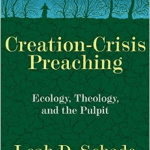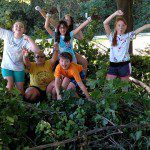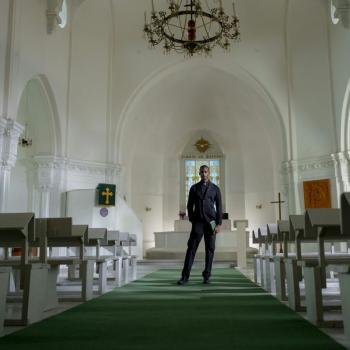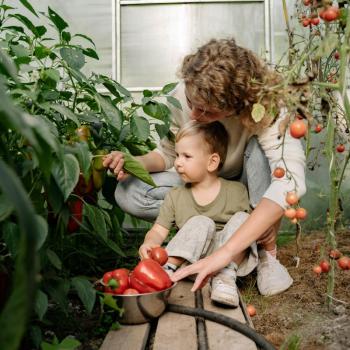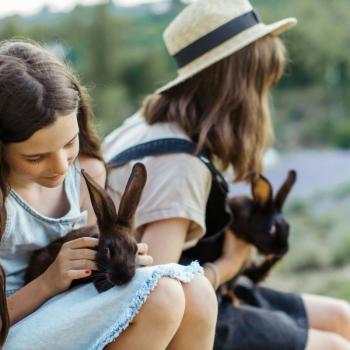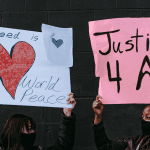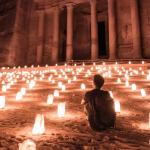For this Earth Day sermon, an 11-year-old’s ill-fated bike ride offers valuable lessons for this time of ecological crisis.
Texts: Lamentations 5:1-21; Psalm 19:1-10; Romans 8:18-25; Luke 12:22-34
You can watch a video of the sermon here: http://www.youtube.com/watch?v=9aycarc4gPQ
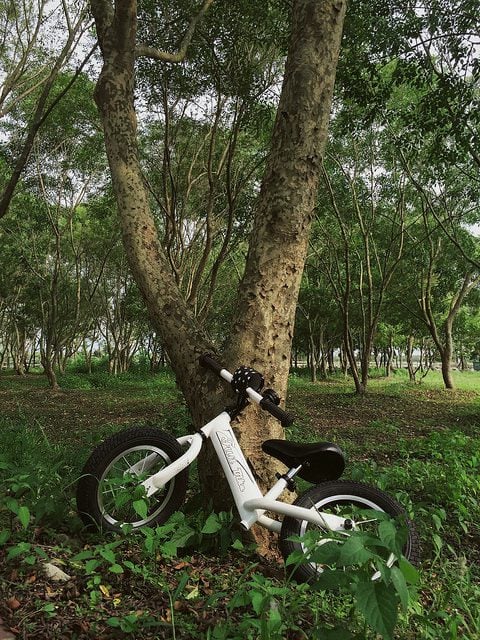
When I was eleven years old, my dad took me up to our hunting camp in the woods of Huntington County, PA. He let me take along my dirt bike so that I could ride along the roads and explore to my heart’s content. Now I was a bit of a tomboy, and always fancied myself to have the physical prowess and luck of Indiana Jones, who was my hero in those days. So it was with a total sense of invincibility that I rode up to what I considered to be the most promising challenge of my dirt bike riding career.
It was a dirt road that ran down the length of a hill at another cabin nearby. I sat there at the top gazing down at what was sure to be the glory of my pre-adolescent life – riding down this hill full speed! The road was pocked with dips and uneven grades, all of which promised a fantastically bumpy ride. And at the bottom was the piece-de-resistance: a small bridge that crossed over a gully at the bottom of the hill, and then a ramp-like rise where the bridge intersected with the main dirt road below, which would send me flying into airborne ecstasy! And then I would land and skid my bike in a cool Evil Kneval move just short of the sheered wall of packed dirt on the other side of the road.
Are you ready to ride?
I took a deep breath, pushed back my hair (helmet? what helmet?), and pushed off. Within seconds I knew I had made the biggest mistake of my pre-adolescent dirt bike riding career! What seemed like such a benign slope at the top turned out to be much steeper than I had anticipated, and those dips and rocks sent my bike pedals spinning so fast, there was no way to get it back under control. I could see the bridge at the bottom rushing faster at me and I knew I was either going to miss the bridge like a bowling ball in the gutter and go right into the gully, or I would indeed go airborne and smack head first into that dirt wall cut in the hillside at the bottom. I was terrified, realizing what a stupid, horrible mistake I’d made. What was I going to do?
And then in a split second one word popped into my head. Looking back now it was the voice of divine intervention. And that voice said one word:
Fall!
FALL!
I quickly realized what I had to do. I had to fall off the bike now or face a much worse fate at the bottom of the hill. So I leaned to the right, the bike caught a rock and down I went, knees first into the dirt and went tumbling. Oh, the pain! I looked down at my knees, red with blood and embedded pebbles. My elbows, too, were bloody. But my head and the rest of my body were fine. I was able to shakily stand up, pick up my bike, and slowly, painfully, crying all the way, make my way down the hill and back to camp.
As I rounded the bend, I saw my dad sitting on the porch reading and smoking his pipe. He knew instantly something was wrong. He ran out to me, took my bike, took one look at me and said: “Whoa, you messed yourself up real good, didn’t you?” Then he took me inside, sat me down, wiped my tears, helped me clean out the bloody mess on my knees and elbows. Huge chunks of skin had been scraped off, but nothing was broken. He promised me when I was all better, we would walk in the woods together again.
Show us your scars!
Every trip back up to camp after that when we drove past that steep hill, everyone would say, “Yep, there’s Leah’s Hill. Show us your scars!” It was legendary.
Leah’s Hill taught me two of the most important lessons of my life. First, just because you think you can pull off something really awesome, but also very risky, doesn’t mean that you should actually do it. Your perspective may be clouded by delusions of immature thinking and unrealistic visions of self-gratification. And second, when things are careening down a hill at out-of-control speeds, the best thing to do is: fall.
My sisters and brothers, I submit to you today that the history of human progress can be compared to the immature thinking and unrealistic visions of self-gratification of an 11-year-old daredevil. We really thought we could pull it off. Like a pre-adolescent, we stood at the top of the hill looking down on a world we felt confident we could conquer. Poised on the wheels of human invention in the areas of science, technology, energy production, capitalist economics, and industrialization, we thought that our plan would work out gloriously. Certainly there would be some bumps along the road, but they would make the adventure more exciting. And the prospects of hitting that ramp and soaring into the air with carefree abandon – free from any concerns but our own pleasure and exhilaration – well, such a promising future would be foolish, and unpatriotic, to ignore.
The difference, of course, is that it was not just one 11-year-old on a bike.
It’s been the entire Western society, on a gigantic bulldozer, a machine retrofitted with jet-fuel packs, built by the subjugated labor of the non-white persons and the poor, bought with the blood of military conflict, which is stripping the entire landscape as it careens down the mountainside, crushing to death any life-form that gets in the way, and all the while spewing noxious exhaust into the air, spilling toxic fluids into our neighborhoods and waterways, exploding all around us in industrial accidents, poisoning the land, water and air from equator to pole. An ecological crucifixion.
My friends, today we are joining more and more people who celebrating the Earth as God’s sacred Creation. We’re reading verses that extol the intrinsic value of God’s created world, and singing hymns that join our voices with the trees and animals and waterways in praise of our Creator God. But I must also share with you a prophetic word about the state of God’s Creation. Just because we think we can pull off something really awesome, but really risky, like extreme energy extraction with mountaintop removal and fracking, doesn’t mean we should actually do it. We are careening down a bumpy hill and we’re on a collision course with global ecological disaster.
I know it’s depressing to hear the litany, but please receive it in the spirit in which it is intended. Our telling the truth about the state of our world is like a form of biblical lament, which Walter Brueggemann tells us achieves three things: recognizes the reality of injustice, loss, and grief; names that injustice as intolerable; and ultimately, moves us to action to follow God’s call to make it right again. [See Brueggeman’s book, The Message of the Psalms: A Theological Commentary, Chapter 3 (Augsburg Fortress: 1984)].
Heed and repeat the prophetic warnings
As people of faith, I call on all of us today to heed and repeat the words both of the Psalm which calls us to rejoice in God’s laws of the natural world that can revive our souls with value that surpasses gold and honey. And to heed and repeat the prophetic warnings of Lamentations which paint a vivid picture of what will happen if we keep careening down this mountainside and smack head-on into that wall. In fact, the nonhuman inhabitants of the earth and the impoverished peoples of our world already cry out with these biblical words: “Our inheritance has been turned over to strangers, our homes to aliens. We must pay for the water we drink. With the yoke on our necks we are hard-driven, no rest. We get our bread at the peril of our lives because of the sword in the wilderness – a sword of our own making! Our hearts are sick, our eyes have grown dim.”
And yet. . .
Can you hear the voice calling to us as we are now realizing that the machine is going too fast and we are out of control? Can you hear the word? The word is: fall. Fall off the bike. Fall off the machine. Just lean to the side, and we can avoid the worst-case-scenario. Yes, it will hurt. It will hurt to give up our lifestyles of comfort and convenience. Yes, it will bruise us to stop living beyond the earth’s means. Yes, our elbows will get injured by relinquishing our attitudes of personal and institutional privilege. Yes, our knees will be scraped and bloodied when we fall into a downwardly mobile, ecologically healing way of life. But as leaders in the church, we must proclaim both the law of the lamentation and its gospel as well, because there was hope at the end of that passage:
“But you, O Lord, reign forever; restore us to yourself, O Lord, that we may be restored.”
When you proclaim the truth that God is bigger than the machine we have created, bigger even than the beautiful suffering planet we are killing, when you proclaim the truth about the mercy of God, you will offer hope that the turning is possible, that the grace of God awaits us . . .
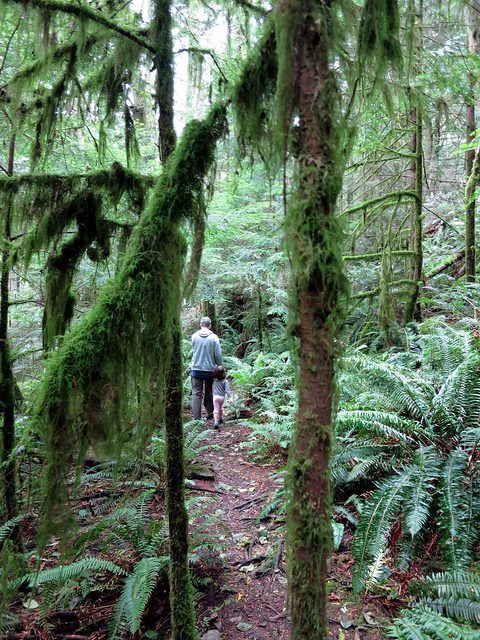
Like a Father, sitting on the porch, who will come out to our prodigal pre-adolescent selves, take the machine from us, shaking his head saying, “Whoa, you sure messed things up, didn’t you?” But the Father will sit us down, wipe away the tears from our eyes, clean out our bloody, pebble-encrusted wounds, and promise us that when we have healed, when the earth has healed, we will walk together in the woods once again. Amen.
Leah D. Schade is the Assistant Professor of Preaching and Worship at Lexington Theological Seminary (Kentucky) and author of the book Creation-CrisisPreaching: Ecology, Theology, and the Pulpit (Chalice Press, 2015).
You can follow Leah on Twitter at @LeahSchade, and on Facebook at https://www.facebook.com/LeahDSchade/.
For a reflection about preaching on Earth Sunday, click here.
Wondering how green your church is? Take this short quiz.
For ideas on incorporating Earth-care into faith practices and preaching, try 17 Ways to be an EcoPreacher.
For ways to help children connect their faith with their love of nature, click here.


